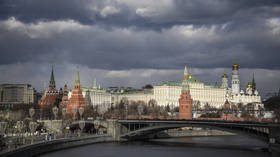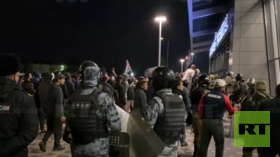Kremlin reacts to anti-Jewish riot in Dagestan

The rioting in Russia’s Republic of Dagestan on Sunday evening was “obviously” influenced by foreign forces, Kremlin spokesman Dmitry Peskov has claimed. The official was referring to the storming of an international airport by an angry crowd that was searching for “refugees from Israel” on board a flight.
“It’s clear that considering the TV footage showing the horror of what is happening in the Gaza Strip – the deaths of... children, elderly men, medics, [and] others – it’s easy for malevolent actors to abuse the situation, escalate it, [and] agitate the people,” Peskov told journalists on Monday.
President Vladimir Putin has repeatedly stressed the importance of interfaith harmony in Russia, the Kremlin press secretary stated. Peskov added that the Russian leader will chair a high-level meeting later on Monday on “the attempts by the West to use the events in the Middle East to divide the Russian society.”
Sunday’s events involved violence and anti-Jewish sentiment breaking out in Makhachkala, the capital of the Muslim-majority Republic of Dagestan. Local officials deployed anti-riot police to reestablish order at the airport.
Ten people, including civilians and police officers, required medical assistance after the clashes, according to the regional Health Ministry. Two individuals were reported to be in a serious condition. Ten others received smaller injuries and did not require hospitalization.
The head of Dagestan, Sergey Melikov, has denounced the actions of the rioters.
“There is no courage in mobbing unarmed people who did nothing wrong,” the official said. “There is no honor in tossing curse words at strangers, getting into their pockets in attempts to check their passports. No good intention can make one attack women and children.”
Melikov later acknowledged lapses in the monitoring and prevention of information attacks in the region, while claiming that fanning religious tensions was an “act of a scoundrel” and “foul game.”
The Makhachkala riot is thought to have been triggered by rumors spread by a Telegram channel that Russian officials believe is connected with the Ukrainian intelligence services.













